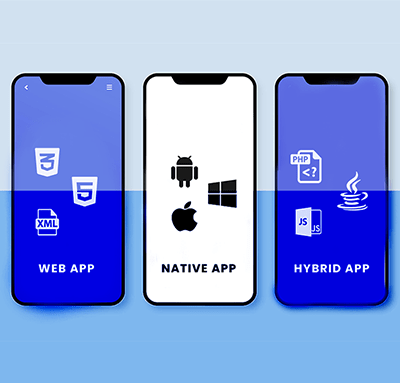
About us
Our Services
Our Expertise
Our Experience
Follow us
Why e2logy?
- We strive to provide superior customer service and ensure that every client is completely satisfied with our work.
- Our engineers are trustworthy, dedicated, and experienced and will go the extra mile to solve your IT issues.
- We are committed to delivering outstanding, cutting-edge IT solutions that add real value that goes beyond what is expected.

Web App vs. Native App vs. Hybrid App Development

Your mobile app development project can be categorized into three main types: web, native, and hybrid. Which development path is right for your project? All three paths have intrinsic value, but which one is most appropriate?
The type of development that businesses should choose depends on the business objectives and product or service goals they need to achieve. This decision can have a major impact on the success of your mobile strategy, depending on your business objectives and overall product goals. When building your mobile app, you will need to consider several factors including whether it will be a native, web, or hybrid app.
Let us have a look.
1. Overview of Each Type of Application
What is Web App Development?
Website development and web app development are easily confused. Web apps usually offer a great deal of information, but websites provide more detail. Therefore, a web is a more compact version of a website, and a web app is known to have enhanced functionalities over a website.
Several browsers such as Chrome, Safari, or Firefox can render the web app. The biggest advantage of a web app is that it does not need to be downloaded from the app store like you would with a mobile app. A web also does not require physical storage on a mobile device since it is rendered on a browser.
The development of web apps is a good option if you wish to cater to a wide range of audiences with mobile-friendly content. The advantage of introducing your product to numerous users through web apps is that they are cost-effective. If the network connectivity is poor, small images may take longer to load if development of this kind.
Advantages of Web Apps:
The following are the advantages of web apps:
- Since web apps share the same code base across various mobile platforms, they require minimal maintenance.
- Web apps can be developed for any platform, provided they can be run in an appropriate web browser.
- Web app development is less expensive than native app development.
- Applications built through the web are not bound by standard OS protocols, and they do not require app store approval. This means they can be launched at any time regardless of the format.
- An updated web app does not require manual updating, and a new version is automatically fetched every time it becomes available.
Disadvantages of Web Apps:
Here are a few disadvantages of web apps:
- Apps developed for the web cannot utilize the device’s features and access to the hardware is limited.
- Browsers are used for web apps. For this reason, users must type their URL or search a specific page to accomplish their purpose. It is a complicated process for the user.
- Since there are many browsers on the market, there are various performance metrics and usage patterns that differ from one browser to the next. It can be difficult to develop a product roadmap from such differences.
- Due to the poor discover ability of web apps, users are unable to discover them without proper marketing. Furthermore, web apps are not listed in app stores.
- When compared to native apps, web applications are slower and less responsive.
- As compared with native apps, they offer a simplified interface with limited interaction.
- Due to web apps not being listed in app stores, there is no opportunity to promote your brand.
What is Native App Development?
Developing native applications is the most common way to create mobile applications. Platform-specific native apps employ languages that adhere to the platform they are developed on. Java and Kotlin are popular languages for developing native Android apps. Objective-C and Swift are the most popular native iOS languages.
Furthermore, specific operating systems use an Integrated Development Environment (IDE) to develop native applications. Some platforms, such as Apple and Google, provide their developer tools, interface elements, and SDKs.
Therefore, many companies choose to develop native mobile apps because of their many benefits.
Advantages of Native App Development:
- Native apps have the best performance out of all approaches.
- Native apps are available in several app stores and marketplaces.
- Apps that are listed in an app store have a greater chance of being discovered by users.
- As far as user input and output are concerned, native apps give users an intuitive interface, interaction, and smooth execution.
- Native app development allows programmers to access the complete feature set of the platform they are targeting.
- Since native apps follow the guidelines of mobile operating systems, there is an enhanced user experience.
- Apps that are native to a platform are approved by the platform’s developers, which means they are secure, high-quality, and device compatible.
Disadvantages of Native App Development:
- To develop native apps, it is necessary to hire experienced developers.
- In comparison to the web or hybrid application development, native application development is an expensive endeavour.
- Developing a native app should not be your choice if you are developing a simple application.
What is Hybrid App Development?
Hybrid app development can work on different platforms and still behaves like a native app. Hybrid apps combine features of a native app and a web application.
Even though hybrid applications are installed on devices like native apps, technically they are web applications. Using HTML, CSS, and JavaScript, developers build hybrid apps that are executed in a WebView.
A hybrid app is a web app that provides access to additional native app functionality. Using a wrapper to act as a bridge between platforms will allow for the inclusion of native features.
Hybrid applications consist of two main parts:
- Codes developed in back-end languages like HTML, CSS, and JavaScript fabricate back-end coding.
- WebView renders the code through a native shell, which can be downloaded.
Advantages of Hybrid App Development:
- Hybrid apps can be accessed without a web browser.
- Apps that use hybrid APIs and hardware can access the device’s internal parts.
- Developers need only one codebase for hybrid app development.
Disadvantages of Hybrid App Development:
- In comparison to native apps, hybrid apps are slower.
- Hybrid development requires the use of a third-party platform for the deployment of the app’s wrapper.
- By personalizing an app more, the purpose behind creating a hybrid app is defeated. Furthermore, native app development allows you to save money without becoming an expensive affair.
- Native and hybrid app development presents problems for developers due to their complexity.
- In hybrid apps, WebViews render the apps, so the performance has been affected.
- User experience is poor due to customizations Alice with hybrid app development.
2. Battle of Performance
Overview
Your app must have superior performance to keep users engaged with it for the long haul. The survey found that slow speed was the most common reason users abandoned the app, screen freezes led to 76% of users abandoning the app, and crashes led to 71% of users abandoning the app. The performance of native apps cannot be matched by any other app type when it comes to evaluating app types.
Native apps
Native apps provide higher performance because they can access device elements and functionality easily. Additionally, these apps utilize a wide range of advanced features (such as USB input, networking, memory management, and more) that enable them to offer a truly unparalleled user experience.
Hybrid apps
A hybrid app, on the other hand, downloads data from a server and utilizes some device features but has limited access to data. That is where native apps perform better in comparison to web apps.
Web apps
As a result, web apps perform differently than native apps because they are affected by the performance of the web connection and the browser.
3. Distribution Channel
Overview
The projection states that there will be 258,2 billion mobile app downloads worldwide by 2022, so it is clear the wider app reach will contribute to an increase in app downloads. Web apps are directly accessible on the web while native and hybrid apps are hosted in an app store.
Native apps
Native apps designed for a particular platform are hosted in the respective stores of the operating systems, both for Android and iOS. The app store can rank native apps based on the functionality and features of the device.
Hybrid apps
As hybrid apps can run on more than one platform, they are often hosted on multiple app stores, thus allowing them to take advantage of available features and rank within the relevant.
Web apps
Websites are accessed through browsers. These apps do not appear in app stores, but they are available directly online.
4. Target Audience and User Experience
Overview
The user experience (UX) and the user interface (UI) of a mobile app are responsible for 70 percent of its retention rate. A top mobile app development company can ensure 100% retention rates by designing an app with the latest UI trends, and with minimal bugs or UX flaws. You should ensure that the user experience of the app relates directly to the target market. By using the right technology, you can make the app a perfect fit for the audience’s preferences, choices, and interests.
Native apps
Apps for Android are free to download, while apps for iOS are cost-prohibitive, so decide what type of users you want to attract. However, native apps must regularly be updated to provide a good user experience.
Hybrid apps
Apps that can run on multiple platforms and have a minimum update requirement are hybrid apps, which are best for reaching the biggest audience. Secondly, native and hybrid apps are best suited if your users will download and access the app offline.
Web apps
As they are accessible from any browser and platform, web apps allow you to target a wide audience. Moreover, web apps typically require fewer updates than native applications, making maintenance easier.
5. Cost of Development
Overview
It is essential to know your budget before you develop any application since development costs are one of the most painful concerns for businesses. The cost of creating native mobile apps is comparatively higher than hybrid apps and web apps since you need to hire different mobile app development teams with different skills.
Native apps
The average development cost for native applications depends on the number of hours the developers spend on the project. The estimate will vary based on the app’s UX/UI design, size, and the complexity of its features.
Hybrid apps
Software development companies can create hybrid apps that can run on multiple platforms by leveraging an existing codebase.
Web apps
The development cost of web apps is more expensive than hybrid apps because web apps have more complex interfaces and functionality.
Conclusion
I hope you have clearly understood the distinction between these three types of applications. In conclusion to this article, it is worth mentioning that each type of app has its advantages and disadvantages. As with the targets and preferences of your audience, the app development will vary significantly based on your budget.
The final success of an application is determined by the ability of the software development team to customize your application to meet the needs of the end-users regardless of the type of app you develop. It is always a good idea to consult an app development company if you have any doubts about any app.













